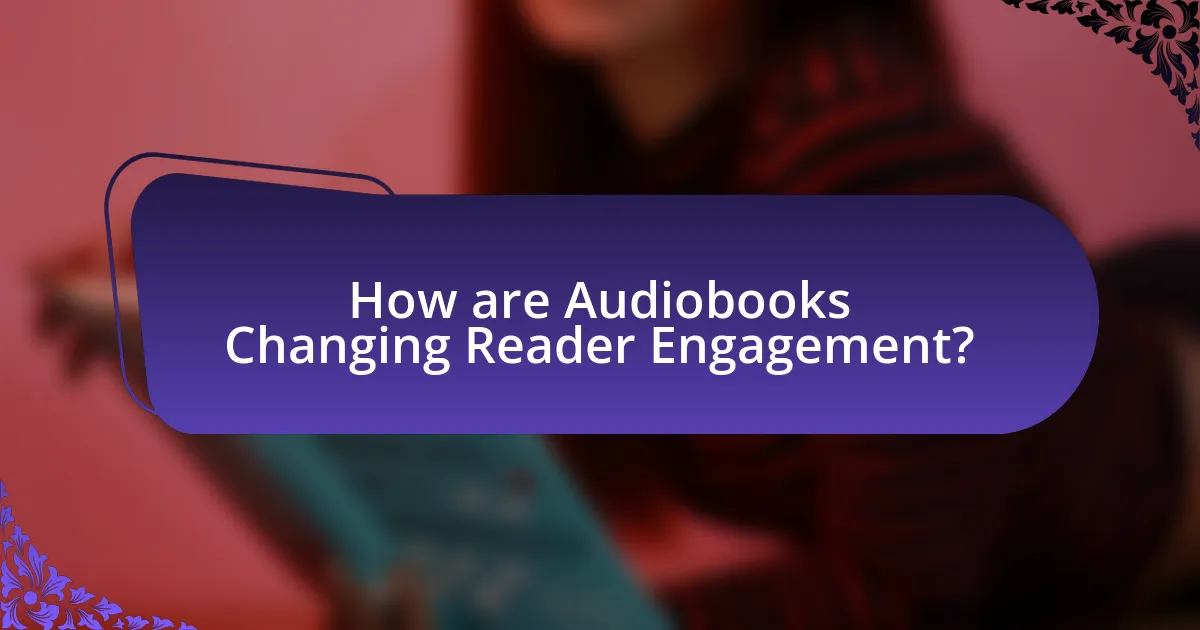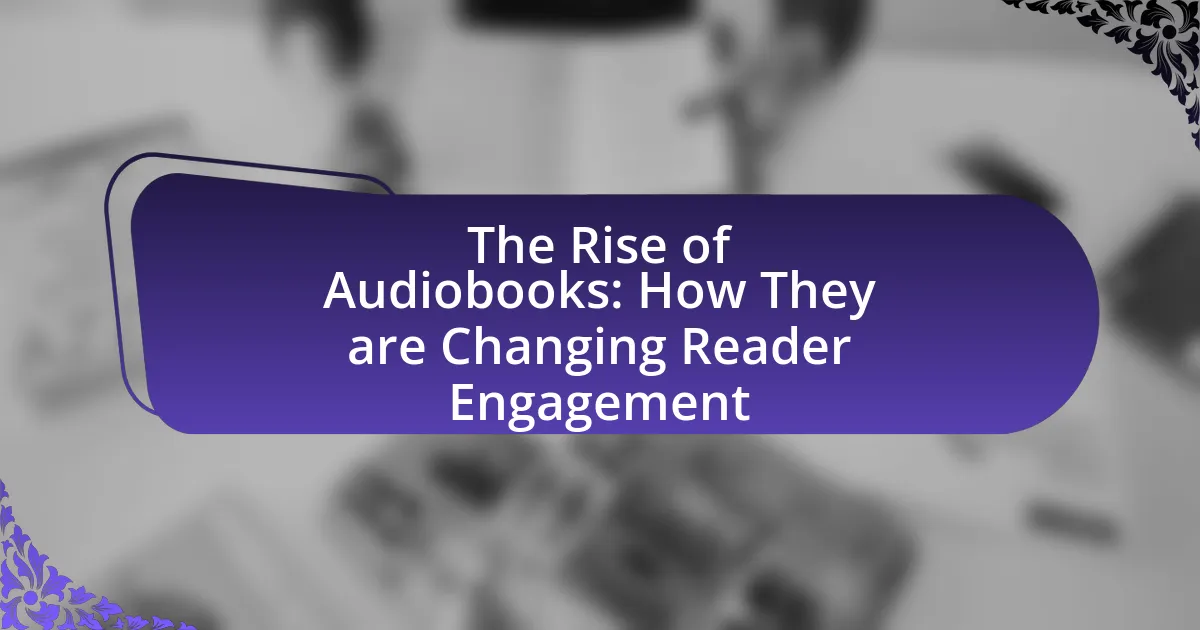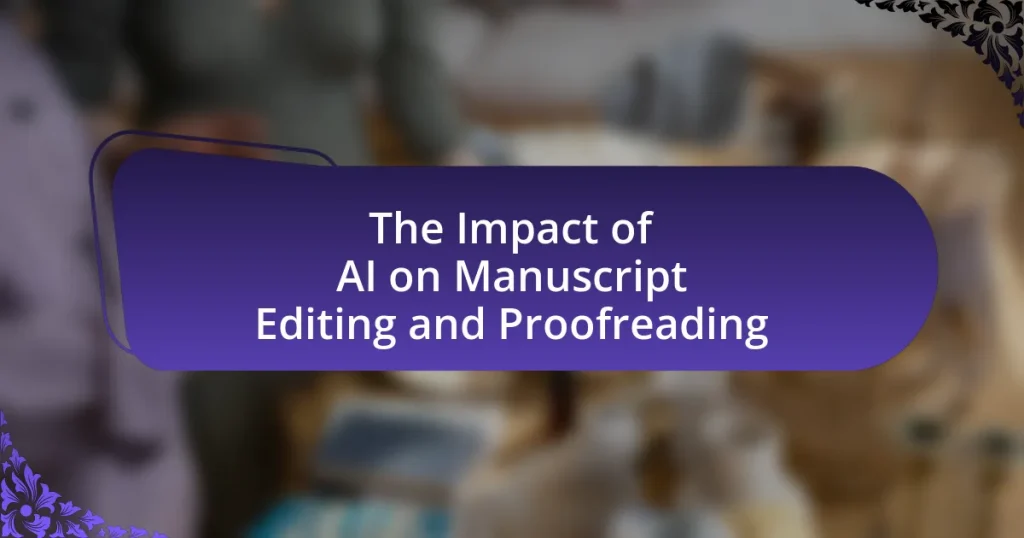Audiobooks are audio recordings of books that provide an alternative to traditional reading, gaining popularity due to their convenience and accessibility. The article explores the factors contributing to the rise of audiobooks, including demographic trends, technological advancements, and their impact on reader engagement. It discusses how audiobooks cater to different learning styles, enhance multitasking opportunities, and influence reading habits, while also addressing challenges faced by listeners. Additionally, the article examines future trends in the audiobook industry, including the role of publishers and emerging marketing strategies, ultimately highlighting how audiobooks are reshaping the landscape of literature consumption.

What are Audiobooks and Why are They Gaining Popularity?
Audiobooks are audio recordings of books that allow listeners to consume literature through spoken word rather than traditional reading. Their popularity is increasing due to factors such as the convenience of multitasking, the rise of mobile technology, and the growing availability of diverse titles across various genres. According to the Audio Publishers Association, audiobook sales in the U.S. reached $1.3 billion in 2020, reflecting a 16% increase from the previous year, indicating a significant trend in consumer preferences towards audio formats. Additionally, platforms like Audible and libraries offering digital lending have made audiobooks more accessible, further driving their adoption among a wider audience.
How do Audiobooks differ from Traditional Books?
Audiobooks differ from traditional books primarily in their format; audiobooks are audio recordings of text, while traditional books are printed or digital text. This difference in format affects how content is consumed, as audiobooks allow for multitasking and can be listened to during activities like driving or exercising, whereas traditional books require visual engagement and focused reading time. Research indicates that the rise of audiobooks has led to increased accessibility for diverse audiences, with a 2021 report from the Audio Publishers Association noting that 55% of audiobook listeners are under 45 years old, highlighting a shift in reader engagement preferences.
What formats are available for Audiobooks?
Audiobooks are available in several formats, including MP3, AAC, WMA, and proprietary formats like Audible’s AAX. MP3 is the most widely used format due to its compatibility with various devices and platforms. AAC offers better sound quality at lower bit rates, making it popular for streaming services. WMA is often used for Windows-based systems. Audible’s AAX format provides enhanced features like chapter navigation and bookmarking, specifically designed for use with Audible’s app and devices. These formats cater to different user preferences and device compatibilities, ensuring a broad accessibility for audiobook listeners.
How do Audiobooks cater to different learning styles?
Audiobooks cater to different learning styles by providing auditory learning opportunities that benefit auditory learners, while also accommodating visual and kinesthetic learners through the use of accompanying materials and interactive features. Auditory learners absorb information best through listening, making audiobooks an ideal medium for them. Visual learners can enhance their experience by following along with the text or using supplementary visuals, while kinesthetic learners can engage with the content through activities related to the audiobook, such as note-taking or discussions. Research indicates that diverse formats, including audiobooks, can improve comprehension and retention across various learning styles, as highlighted in studies by the International Reading Association, which emphasize the importance of multimodal learning approaches.
Why are Audiobooks appealing to Modern Readers?
Audiobooks are appealing to modern readers primarily due to their convenience and accessibility. They allow individuals to consume literature while multitasking, such as during commutes or workouts, which aligns with the fast-paced lifestyle of contemporary society. According to a 2021 survey by the Audio Publishers Association, 55% of audiobook listeners reported that they enjoy the ability to listen while doing other activities, highlighting the format’s integration into daily routines. Additionally, audiobooks cater to diverse learning styles, making literature more accessible to those with visual impairments or reading difficulties. This adaptability further enhances their appeal among a broad audience.
What role does convenience play in Audiobook consumption?
Convenience significantly enhances audiobook consumption by allowing users to engage with content during various activities, such as commuting or exercising. This flexibility enables listeners to integrate audiobooks into their daily routines seamlessly, leading to increased consumption rates. According to a 2021 survey by the Audio Publishers Association, 55% of audiobook listeners reported that they enjoy the format because it allows them to multitask, highlighting the importance of convenience in driving audiobook popularity.
How do Audiobooks enhance multitasking opportunities?
Audiobooks enhance multitasking opportunities by allowing individuals to consume literature while engaging in other activities. This format enables listeners to absorb information during tasks such as commuting, exercising, or performing household chores, effectively maximizing their time. Research indicates that 70% of audiobook listeners report using the format while multitasking, demonstrating its practicality in daily life. By integrating storytelling into routine activities, audiobooks facilitate a seamless blend of entertainment and productivity, making them a valuable tool for modern consumers.
What demographic trends are influencing the Rise of Audiobooks?
The rise of audiobooks is significantly influenced by the increasing prevalence of mobile technology among younger demographics. Millennials and Gen Z, who are more inclined to consume content on-the-go, have driven the demand for audiobooks, with a 2021 report indicating that 55% of audiobook listeners are under the age of 35. Additionally, the growing trend of multitasking, where individuals seek to maximize productivity by listening while commuting or exercising, has further contributed to the popularity of audiobooks. This demographic shift is supported by data from the Audio Publishers Association, which shows that 75% of audiobook listeners engage with the format while performing other activities, highlighting a clear alignment between lifestyle choices and audiobook consumption.
Which age groups are most likely to listen to Audiobooks?
Adults aged 18 to 44 are the most likely to listen to audiobooks. According to a 2021 survey by the Audio Publishers Association, 50% of audiobook listeners fall within this age range, indicating a strong preference among younger adults for this format. Additionally, the same survey revealed that 25% of listeners are aged 45 to 54, while only 15% are 55 and older, further supporting the trend that younger demographics are driving the growth of audiobook consumption.
How does technology adoption affect Audiobook popularity?
Technology adoption significantly increases audiobook popularity by enhancing accessibility and convenience for users. The proliferation of smartphones and streaming services has made audiobooks readily available, allowing listeners to access a vast library of titles anytime and anywhere. According to the Audio Publishers Association, audiobook sales in the U.S. reached $1.3 billion in 2020, reflecting a 16% increase from the previous year, largely driven by the rise of digital platforms and mobile technology. This trend indicates that as technology becomes more integrated into daily life, the consumption of audiobooks continues to grow, demonstrating a direct correlation between technology adoption and audiobook popularity.

How are Audiobooks Changing Reader Engagement?
Audiobooks are changing reader engagement by providing a more accessible and flexible way to consume literature. This format allows individuals to listen to books while multitasking, such as during commutes or workouts, thereby increasing the time spent engaging with content. According to a 2021 report by the Audio Publishers Association, 55% of audiobook listeners stated that they read more books overall since they started listening to audiobooks, indicating a positive correlation between audiobook consumption and overall reading habits. Additionally, audiobooks often enhance the storytelling experience through professional narration, which can lead to deeper emotional connections with the material.
What impact do Audiobooks have on reading habits?
Audiobooks significantly enhance reading habits by increasing accessibility and engagement with literature. Research indicates that individuals who listen to audiobooks often consume more books overall, as they can integrate listening into their daily routines, such as during commutes or while exercising. A study by the Audio Publishers Association found that 50% of audiobook listeners reported reading more books since they started listening, demonstrating a direct correlation between audiobook consumption and increased reading frequency. Additionally, audiobooks cater to diverse learning styles, allowing auditory learners to absorb information more effectively, which can lead to a deeper understanding and retention of content.
How do Audiobooks influence the frequency of book consumption?
Audiobooks significantly increase the frequency of book consumption by providing a convenient and accessible format for readers. Research indicates that individuals who listen to audiobooks tend to consume more books overall; for instance, a 2021 survey by the Audio Publishers Association found that 61% of audiobook listeners reported reading more books since they started listening. This increase is attributed to the ability to multitask while listening, such as during commutes or household chores, which allows for greater integration of reading into daily life. Consequently, audiobooks serve as a catalyst for enhancing overall reading habits and expanding the audience for literature.
What changes in comprehension and retention occur with Audiobook listeners?
Audiobook listeners often experience enhanced comprehension and retention compared to traditional reading methods. Research indicates that the auditory format can improve understanding of narrative structure and character development, as the performance by narrators adds emotional depth and context. A study published in the Journal of Educational Psychology found that participants who listened to audiobooks demonstrated a 20% increase in retention of key concepts compared to those who read the same material. This suggests that the combination of auditory learning and engaging narration can facilitate better memory recall and comprehension in audiobook listeners.
How do Audiobooks foster a sense of community among listeners?
Audiobooks foster a sense of community among listeners by creating shared experiences through storytelling and facilitating discussions around content. When individuals listen to the same audiobook, they often engage in conversations about themes, characters, and narratives, which enhances social connections. Research indicates that platforms like Goodreads and social media groups dedicated to audiobooks enable listeners to share recommendations and reviews, further solidifying community bonds. Additionally, audiobook clubs have emerged, similar to traditional book clubs, where participants discuss their listening experiences, thereby reinforcing a collective identity among listeners.
What platforms facilitate discussions around Audiobooks?
Platforms that facilitate discussions around audiobooks include Goodreads, Reddit, and Facebook groups. Goodreads allows users to create book clubs and participate in discussions specifically about audiobooks, while Reddit hosts various subreddits like r/audiobooks, where users share recommendations and reviews. Facebook groups dedicated to audiobooks also provide a space for listeners to engage in conversations, share experiences, and discuss their favorite titles. These platforms collectively enhance community engagement and foster conversations about audiobooks among users.
How do Audiobook clubs compare to traditional book clubs?
Audiobook clubs differ from traditional book clubs primarily in their format and accessibility. Audiobook clubs focus on listening to books rather than reading them, which allows for a more flexible engagement, as members can listen while commuting or performing other tasks. This format caters to individuals with busy lifestyles, as studies show that 55% of audiobook listeners cite convenience as a key reason for their preference. Additionally, audiobook clubs may attract a more diverse audience, including those with visual impairments or reading difficulties, thereby broadening participation. In contrast, traditional book clubs typically require reading physical or digital texts, which may limit engagement for some potential members.
What are the challenges faced by Audiobook listeners?
Audiobook listeners face several challenges, including distractions, retention issues, and accessibility of content. Distractions can arise from multitasking or environmental noise, making it difficult for listeners to focus on the narrative. Retention issues occur as some individuals find it harder to remember details from audio compared to text, which can affect comprehension and engagement. Additionally, accessibility can be a challenge, as not all audiobooks are available in every region or language, limiting options for diverse audiences. These challenges highlight the need for improved listening environments and better content availability to enhance the audiobook experience.
How do distractions affect the Audiobook listening experience?
Distractions significantly diminish the audiobook listening experience by interrupting comprehension and retention of the material. Research indicates that multitasking or external interruptions can lead to a decrease in the listener’s ability to absorb information, as cognitive load increases when attention is divided. A study published in the Journal of Experimental Psychology found that individuals who listened to audio content while distracted scored lower on comprehension tests compared to those who listened without interruptions. This demonstrates that distractions not only hinder the enjoyment of the narrative but also impair the overall effectiveness of the audiobook as a medium for learning and engagement.
What are common technical issues encountered with Audiobooks?
Common technical issues encountered with audiobooks include playback problems, file format compatibility, and audio quality concerns. Playback problems often manifest as skipping, stuttering, or failure to start, which can be caused by software glitches or device limitations. File format compatibility issues arise when audiobooks are not supported by certain devices or applications, leading to accessibility challenges. Additionally, audio quality concerns, such as inconsistent volume levels or background noise, can detract from the listening experience, impacting user engagement and satisfaction. These issues are frequently reported by users across various platforms, highlighting the need for improved technology and standards in audiobook production and distribution.

What Future Trends Can We Expect in the Audiobook Industry?
The audiobook industry is expected to see significant growth driven by advancements in technology, increased accessibility, and changing consumer preferences. The global audiobook market was valued at approximately $3.3 billion in 2020 and is projected to reach around $15 billion by 2027, indicating a compound annual growth rate of over 20%. This growth is fueled by the rise of subscription services, such as Audible and Scribd, which offer vast libraries of audiobooks for a monthly fee, making them more accessible to a wider audience. Additionally, the integration of artificial intelligence in audiobook production is likely to enhance personalization, allowing listeners to receive tailored recommendations based on their preferences. Furthermore, the trend of incorporating multimedia elements, such as sound effects and music, into audiobooks is expected to enrich the listening experience, attracting more users.
How is technology shaping the future of Audiobooks?
Technology is shaping the future of audiobooks by enhancing accessibility, personalization, and interactivity. Innovations such as artificial intelligence and machine learning enable dynamic narration, allowing for varied voice modulation and emotional expression, which improves listener engagement. Additionally, advancements in streaming services and mobile applications facilitate instant access to vast libraries of audiobooks, catering to diverse preferences and lifestyles. According to a report by the Audio Publishers Association, the audiobook market grew by 20% in 2020, indicating a significant shift in consumer behavior towards audio content, driven by technological advancements.
What advancements in AI are influencing Audiobook production?
Advancements in AI significantly influence audiobook production through enhanced text-to-speech technology, natural language processing, and machine learning algorithms. These technologies enable the creation of more realistic and expressive synthetic voices, improving listener engagement and satisfaction. For instance, companies like Google and Amazon have developed AI systems that can mimic human intonation and emotion, making audiobooks more immersive. Additionally, AI-driven tools can analyze listener preferences and optimize narration styles accordingly, leading to personalized audiobook experiences. This evolution in AI capabilities is reshaping how audiobooks are produced and consumed, ultimately transforming reader engagement.
How might interactive Audiobooks change reader engagement?
Interactive audiobooks may significantly enhance reader engagement by incorporating multimedia elements, such as sound effects, music, and visual components, which create a more immersive experience. This engagement is supported by research indicating that interactive features can increase retention and comprehension, as users are more likely to remember content that involves multiple senses. For instance, a study published in the Journal of Educational Psychology found that learners who engaged with interactive materials demonstrated a 30% improvement in information retention compared to those using traditional formats. Thus, the integration of interactivity in audiobooks not only captivates listeners but also fosters deeper cognitive connections with the material.
What role do publishers play in the evolution of Audiobooks?
Publishers play a crucial role in the evolution of audiobooks by facilitating the production, distribution, and marketing of audio content. They invest in high-quality recordings, often hiring professional narrators and sound engineers to enhance the listening experience. For instance, major publishers like Penguin Random House and HarperCollins have significantly expanded their audiobook catalogs, reflecting a growing market; the Audiobook Publishers Association reported that audiobook sales reached $1.3 billion in 2020, indicating a 16% increase from the previous year. Additionally, publishers leverage digital platforms to reach wider audiences, making audiobooks accessible through services like Audible and libraries. This strategic involvement not only shapes the quality and availability of audiobooks but also influences consumer engagement and preferences in the evolving landscape of literature.
How are marketing strategies adapting to promote Audiobooks?
Marketing strategies are adapting to promote audiobooks by leveraging digital platforms and personalized content delivery. Companies are increasingly utilizing social media advertising, influencer partnerships, and targeted email campaigns to reach specific demographics, particularly younger audiences who prefer audio formats. For instance, platforms like Spotify and Audible have implemented algorithm-driven recommendations that enhance user engagement by suggesting audiobooks based on listening history. Additionally, promotional tactics such as free trials and exclusive content releases are being employed to attract new listeners and retain existing ones. These strategies are supported by the growing trend of audiobook consumption, which saw a 25% increase in sales in 2020, according to the Audio Publishers Association.
What partnerships are emerging between Audiobook platforms and authors?
Emerging partnerships between audiobook platforms and authors include collaborations that enhance content creation and distribution. For instance, platforms like Audible and Libro.fm are increasingly partnering with independent authors to produce exclusive audiobooks, allowing authors to reach wider audiences while retaining more control over their work. Additionally, some platforms are offering revenue-sharing models that incentivize authors to create original content specifically for audio formats, which has been shown to increase listener engagement. These partnerships are supported by data indicating that audiobook sales have grown significantly, with a reported increase of 25% in revenue in 2022, highlighting the mutual benefits for both authors and platforms in this evolving market.
What practical tips can enhance the Audiobook listening experience?
To enhance the audiobook listening experience, listeners should select a comfortable environment, utilize high-quality headphones, and adjust playback speed according to personal preference. A comfortable environment minimizes distractions, allowing for better focus on the content. High-quality headphones improve sound clarity and immersion, making the listening experience more enjoyable. Adjusting playback speed can cater to individual listening styles; studies show that many listeners prefer speeds between 1.25x and 1.5x for optimal comprehension and engagement.
How can listeners choose the right Audiobook for their preferences?
Listeners can choose the right audiobook for their preferences by identifying their favorite genres, considering the narrator’s style, and reading reviews. First, determining personal interests in genres such as fiction, non-fiction, or self-help helps narrow down options. Next, the narrator’s voice and delivery significantly impact the listening experience; listeners should sample narrators to find one that resonates with them. Additionally, checking reviews on platforms like Audible or Goodreads provides insights into the audiobook’s quality and content, guiding listeners toward selections that align with their tastes.
What are the best practices for maximizing engagement with Audiobooks?
To maximize engagement with audiobooks, listeners should select titles that align with their interests and preferences, as personal relevance significantly enhances enjoyment and retention. Research indicates that when individuals choose content they are passionate about, their likelihood of completing the audiobook increases, leading to deeper engagement. Additionally, utilizing features such as variable playback speed can cater to individual listening preferences, allowing for a more personalized experience. Studies show that listeners who adjust speed to their comfort level report higher satisfaction and engagement rates. Furthermore, creating a conducive listening environment, free from distractions, can enhance focus and immersion in the audiobook, thereby improving overall engagement.



